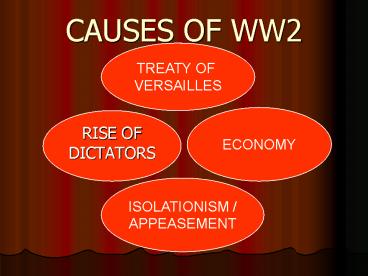CAUSES OF WW2 - PowerPoint PPT Presentation
Title: CAUSES OF WW2
1
CAUSES OF WW2
TREATY OF VERSAILLES
ECONOMY
- RISE OF DICTATORS
ISOLATIONISM / APPEASEMENT
2
CAUSES OF WW2
- Treaty of Versailles
- Rise of Dictators
- The Economy
- Isolationism / Appeasement
3
Before WW1
After WW1
4
From left David Lloyd George (Britain), Vittorio
Orlando (Italy), Georges Clemenceau (France),
Woodrow Wilson (United States)
5
Signing of the treaty in the Hall of Mirrors in
Versailles Palace
6
(No Transcript)
7
(No Transcript)
8
(No Transcript)
9
(No Transcript)
10
TREATY OF VERSAILLES
- GERMANY
- 33 billion in reparations 500M/yr. for 66
yrs. - Military restrictions
- - 100K troops no reserves
- - 6 warships w/ a limit of 10K tons
- - no submarines
- - no air force
- - no production of weapons
11
TREATY OF VERSAILLES
- 3) Land losses including Polish corridor,
Danzig, colonies - 4) Forced to sign war guilt clause
- 5) Army returns home undefeated German army
believes politicians sold out the military
12
(No Transcript)
13
TREATY OF VERSAILLES
- US lenient conciliatory
- Woodrow Wilson wanted the League of Nations
conceded on many points to get it - Treaty never passed Congress US does not join
League - Russia not invited (Communist)
- (1918) Treaty of Brest-Litovsk had Russia
surrendering to Germany - Lost more land than Germany
14
TREATY OF VERSAILLES
- FRANCE - vindictive
- Alsace-Lorraine region returned
- Rhine River area West side to be occupied East
side was DMZ (50 km) - coal-rich Saar region placed under League of
Nations control for 15 years - BRITAIN mediator b/t US France
- 1) Avoid any arrangement that might drag them
into another war 750K dead shattered economy
15
RISE OF DICTATORS
- Germany Adolf Hitler
- Promised jobs end of depression
- Reverse Versailles embarrassment
- Would solve Jewish problem
- USSR - Joseph Stalin
- Replaced Lenin by eliminating competition
- Wanted to catch up to West industrially
16
RISE OF DICTATORS
- Italy - Benito Mussolini
- Promised a new Roman Empire
- Fascism 1 party political system
- Public works projects increasing military
helped economy - Japan - Hideki Tojo
- Militarist demanding US respect
- Goal Japanese empire in Pacific
17
GERMAN WAR DEBTS
- 1924 - Dawes Plan US (from private sources)
loans to Germany to repay debts to Fr. Brit.
they then repay debts to US businesses - 1930 - Young Plan lowered German reparations
ended Rhineland occupation 5 yrs. early in 1930 - 1932 Lausanne Conference German war debts
reduced 90 Brit. Fr. upset loans to US not
reduced or cancelled
18
ECONOMY
- High tariffs restrict trade countries wanted to
protect home industries - War efforts financed by printing too much paper
money inflation - War debts reparation payments increase
inflation rates - Great Depression spreads globally, tariffs rise
all nations are impacted
19
GERMAN ECONOMIC PROBLEMS AFTER WORLD WAR I
Before WW1, 4.2 German marks equaled 1 US
dollar. By 1919, 9 marks equaled 1 US dollar. 3.
In January 1921, German currency was worth 64
marks to the dollar. 4. In January 1923, it took
18,000 marks to equal the US dollar. 5. By
November 1923 this had changed to
4,200,000,000,000 marks to the dollar. PRICE
OF A LOAF OF BREAD In 1918 a loaf of bread cost
just over half a mark. By 1922 the cost had
risen to 163 marks for a loaf of bread. By
November of 1923 a loaf of bread cost 201,000
million marks
20
World War I had been fought to save the skins of
American bankers who had bet too boldly on the
outcome of the war and had two billions of
dollars of loans to the Allies in jeopardy.
Report of Sen. Gerald Nyes Committee
21
ISOLATIONISM / APPEASEMENT
- US Neutrality Acts b/c of Nye Committee -
greedy bankers munitions makers caused US entry
into WW1 - USSR traded Germ. weapons factories for
training USSR military - France defensive alliances w/ Poland
Czechoslovakia Maginot Line, Rhineland
occupation - Britain Munich Pact, naval pact w/ Germ.
- League of Nations Rhineland, Ethiopia,
Manchuria, China, Czechoslovakia
22
Benito Mussolini Italian Fascist leader 1922-1943
- 1922 marched on Rome w/ black shirt supporters
- Fascism promoted nationalism, anti-liberalism,
anti-socialism
23
Benito Mussolini Clara Petachi, Milan 1945
24
Adolf Hitler German Chancellor Nazi
dictator 1932-1945
- 11/1923 - Beer Hall Putsch
- rearmament, militarization, racial purification
- no retreat, no surrender policy
- Fuhrer principle
25
Hideki Tojo Japanese Prime Minister 1941-1944
- Advocated
- Alliance w/ Germany
- East Asia expansion
- no compromise w/ US
26
Joseph Stalin Soviet Union dictator 1924-1953
- Used political connections, alliances and
backstabbing to gain power - Used purges (1930s) to keep power
- Scorched earth policy denied Germans needed
supplies - Wanted a 2nd front
27
Neville Chamberlain British Prime
Minster 1937-1940
- Felt Germany was mistreated at Versailles
- Thought Hitlers promises could be trusted
28
Winston Churchill British Prime Minister 1940-1945
- Speeches great for British morale
- Close relationship with FDR paid off w/ help from
US
29
Franklin Roosevelt US President 1933-1945
- 1st 4-term president
- Politics demanded moving the US slowly from
isolationism to involvement - Looked for a big event that would change public
opinion about the war
30
Charles DeGaulle, leader of Free French Movement
31
Chiang Kai-shek Chinese Nationalist leader
32
Mao Zedong Chinese Communist leader
33
(No Transcript)































